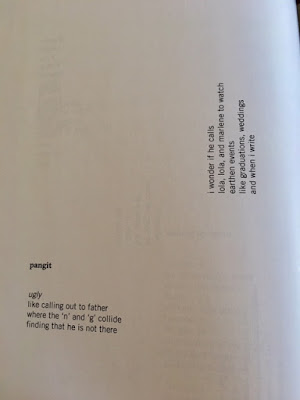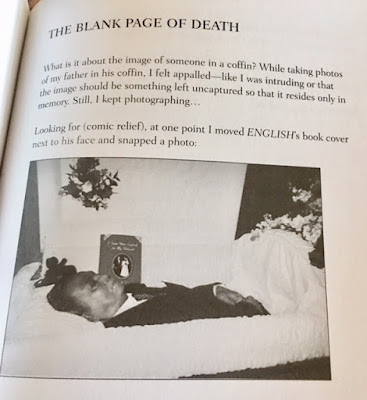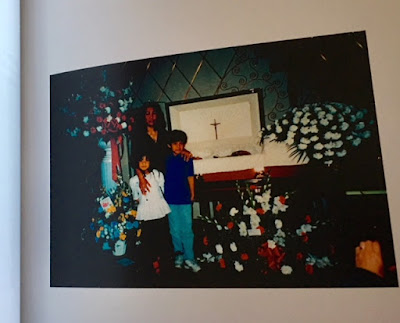EILEEN TABIOS Engages
like a solid to a shadow by Janice Lobo Sapigao
(Timeless, Infinite
Light, Oakland, 2017)
Before my father Filamore Tabios, Sr. died on April 11,
2006, I had spent the few weeks by his bedside. Because we knew ahead of time
that by his bedside meant by his deathbed, I grieved his death even while he
was alive. His (impending) death was so painful that I wrote and wrote and
wrote trying to—and as if I could—write the grief out of my body. I wrote and wrote
and wrote trying to write the impossible.
Those writings came to form the core of a book released just a year
later, THE LIGHT SANG AS IT LEFT YOUR EYES: Our Autobiography (New York. Marsh Hawk Press, 2007). It’s also a
book that I was never comfortable promoting (though I felt I had to market it
in fairness to its publisher). I wrote it in a fever. I published it in a
fever. When the fever would come to abate (something that didn’t begin abating
for over a year after my father died), I came to second-guess my decisions
about the book. I second-guessed it even as I couldn’t read it for a long time. I wrote it, published it, but found it too difficult to read
it from beginning to end.
Its readers would tell me things like it was their favorite
book among those I’d written. One paid it the highest compliment of how it
helped her come to terms with her own father’s death. It received several
positive reviews. But it was difficult for me to read it.
I could go on. But this article is not supposed to be about
my book. It’s supposed to be about another book: Janice Lobo Sapigao’s like a solid to a shadow. I apologize
now for first taking up time about my book—but such is the power of like a solid to a shadow that it turned
me towards a book whose existence I’d actually tried to ignore for nearly a
decade. My first act after finishing my first read of Sapigao’s book was to go
to the basement, find the box where I’d kept my copies, and bring out several
copies of the book I wrote for my father. In a ceremony witnessed only by my
dog Ajax, I brought that book out into the light. I now know I shall read it
again, acknowledge my grief but also acknowledge my love for my father. As of
the day I read like a solid to a shadow,
my own book about my father thrives on my bookshelf rather than in a
closed box in a dim basement. Thank you, Janice Lobo Sapigao.
like a solid to a
shadow also is about grieving a father’s death as well as grieving a
father. Sapigao’s father died when she
was six years old. Part of the impetus for Sapigao’s project was transcribing cassette tapes of love letters sent by her father to her mother during their courting days. Complicating the project was how her father spoke in Ilokano and Sapigao's lack of fluency in this language.
What’s admirable about Sapigao’s project are, among others, its many layers
of complexity, including its address of translation. Translation is a fitting
layer since the entire poetic project, if as also as means to “find” her
father, is translation. Specifically, it is “ultratanslation” which can be
described in this quote from Antena that Sapigao highlights as one of the
epigraphs in the book:
“Ultratranslation—an
awareness or hum or breath … moments within translation, a part of translation
parting it to expose the irreducible gaps.”
Thus, does poetry arises.
And the poems are evocative, e.g.
ragsak
happy
difficult to come by
definitive feeling
enjoyed its closed experience
and
rugi
begin
the line you drag
across the paper
fumbles over itself;
from a cloak somewhere
and nowhere at the same
time
I know enough Ilokano to know the words “ragsak” and “rugi”
and appreciate Sapigao’s witty redefinitions. Sapigao’s poems also befit its
theme if the title can be a theme. Here’s an example that deftly generates
reader empathy as it moves from abstraction ("to go left") to something concrete (no pun intended):
katigid
to
go left
stand at the edge of the cliff
move forward a bit
use your tippy toes
til you feel a string of concrete
on the balls of your feet
“katigid” is another one of the poems that begin with an
Ilokano word which Sapigao then poetically defines, and defines within the
stated concerns of her book which presents an archaeological search for her
father.
“Poetically define,” I say, and yet what I’m talking about
again is translation. As Sapigao notes in her poem “Where My Name Is From,”
My last name Sapigao means ‘wait
until you’re 24 to do enough research, to ask questions, to wait and find out
that it only means ‘nuts.’ ‘Nuts of the bird.’ Sapigao means ‘pretend it means
seeds, seeds of a bird.’ Then poeticize the bird, let it fly. Then poeticize
the seeds, ‘I am the seed of a bird that flies.’ My dad flies. My dad is the
bird. I carry his name far. I fly.
As the matter at hand is translation—including its
impossibilities—it also makes sense that some poems are literally presented
slant (click on all images to enlarge):
Somehow, that slanted quatrain ("i wonder if he calls / lola, lola, and marlene to watch / earthen events / like graduations, weddings / and when i write") is more … bludgeoning …
because it’s at a slant. The form manifests its impossibility. For the father
who died when the poet was six years old, there is no “he” (or who is the “he”)
who witnesses graduations, weddings, “and when I write.”
And here’s another layer—the hierarchy between Tagalog
versus the approximately 175 other languages that exist in the
ancestral land, the Philippines (Tagalog, by being the language spoken in
Manila and the capital Quezon City, also represents those who’ve had more power
among the Filipinos):
So there are politicized moments in the book, and yet its
power also remains from the personal. This example below also presents another
of the book’s strengths: how the visual enhances (meta imagism is the phrase
that came to mind as I read/saw this page) as the words fade toward the end of the page:
Politics cannot exist without history and the book also
abounds with it – making it not just a personal narrative but an educational
text:
Last but not least, the poetry collection can read
like a novel. There is a story in here that the poet did not know existed
before she embarked on her “research.” I
was astonished by it, and so don’t want to be a spoiler by revealing it, except to say
that it relates to
What I learned about being Ilokano: stubbornness, perseverance. Stubborn Sapigao
persevered and, in the process, created poetry as well as displayed courage.
This book has an impact, such as the one I described for me. Its impact will be
different, of course, for each reader. But, for me, the impact was powerful.
I’ll end by sharing a photo of my father from my book—I actually had been
challenged by a reader for sharing this image (as if it was a form of obscenity
instead of a poet’s faltering/imperfect but determined attempt to hold on to
her father):
I shared the above image because of the ending—the last
image—in Sapigao’s book:
As a daughter who experienced her father’s death, I found
affirmation in like a solid to a shadow—an
affirmation such that I brought out from a basement’s shadows the book I wrote
after and for my own father. It’s a response—and empathy—I (and no doubt other
authors) would hope my (our) books generate in others. Sapigao saw me. And I,
in this book, see her … and the family she moves me now to call mine. Such is
the power of her poetry.
Agyamanac unay, Janice. Dios ti agngina.
*****
Eileen Tabios is the editor of Galatea Resurrects. She loves books and has released over 50 collections of poetry, fiction, essays, and experimental biographies from publishers in nine countries and cyberspace. Her 2018 poetry collections include HIRAETH: Tercets From the Last Archipelago and MURDER DEATH RESURRECTION: A Poetry Generator. She is the inventor of the poetry form “hay(na)ku” which will be the focus of a 15-year anniversary celebration at the San Francisco Public Library in 2018. Translated into eight languages, she also has edited, co-edited or conceptualized 13 anthologies of poetry, fiction and essays as well as served as editor or guest editor for various literary journals. Her writing and editing works have received recognition through awards, grants and residencies. More information is available at http://eileenrtabios.com







